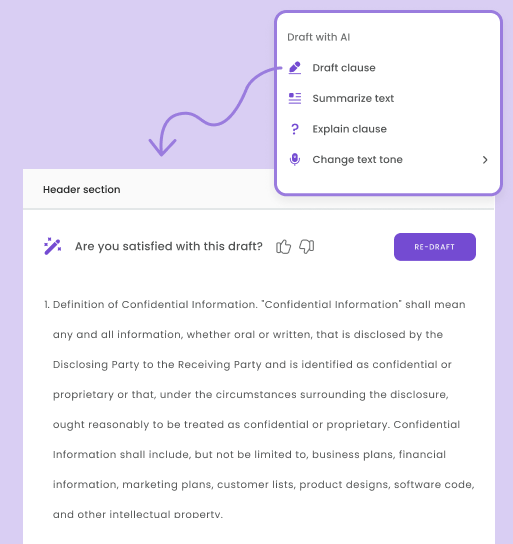Oftentimes, we’re at the mercy of forces outside of our control. This happens in our business and personal lives. That’s where the Force Majeure clause comes into play to protect our interests when things go out of control.
In this guide, you’ll learn what a Force Majeure clause is, how it’s used, and how to make one that’s effective at protecting the interests of everyone involved.
Understanding Force Majeure
Force majeure is a legal concept used in contracts to refer to unforeseen and uncontrollable events that prevent one or both parties from fulfilling their contractual obligations. These events are often considered beyond the control of the parties and can include natural disasters, wars, strikes, government actions, and other similar events.
Origins and Historical Context:
The concept of force majeure has its roots in civil law systems, particularly in European legal traditions. It evolved as a way to address situations where contractual obligations became impossible to fulfill due to extraordinary events beyond the parties’ control. The term “force majeure” itself originates from French law, where it translates to “superior force.”
Historically, force majeure clauses were not as common or detailed in contracts as they are today. However, the importance of addressing unforeseen events in contracts gained prominence with the growth of international trade and business activities. This was especially true during times of war, economic instability, and other global challenges, where parties sought to mitigate risk by including force majeure clauses in contracts.
Core Elements and Components:
Force majeure clauses in contracts typically include the following core elements and components:
- Definition of Force Majeure Events: The clause lists the specific events that are considered force majeure, such as acts of nature (earthquakes, floods, hurricanes), acts of war, government actions (embargoes, sanctions), strikes, and more.
- Impossibility or Impediment: The occurrence of a force majeure event must make it impossible or extremely difficult for one or both parties to fulfill their contractual obligations.
- Notification: The party affected by the force majeure event is usually required to promptly notify the other party about the event, its impact on the contract, and any steps to mitigate the effects.
- Temporary Suspension: Force majeure clauses often allow for a temporary suspension of contractual obligations until the force majeure event is resolved.
- Impact on Performance: The clause may outline the effects of a force majeure event on specific aspects of the contract, such as delays in delivery, extensions of deadlines, or termination rights.
- Allocation of Risk: Force majeure clauses address the allocation of risk between the parties. Depending on how the clause is drafted, the risk of performance failure due to force majeure events may be shifted to one party or shared by both parties.
- Termination Rights: In some cases, if the force majeure event persists for an extended period, the parties might have the right to terminate the contract without penalty.
- Mitigation and Alternative Solutions: The clause may require the parties to take reasonable steps to mitigate the impact of the force majeure event and to explore alternative solutions to fulfill the contract.
Force majeure clauses are essential for managing uncertainty and unexpected events in contracts, especially in complex and international business transactions. However, the specific language and terms within the clause should be carefully negotiated and drafted to reflect the parties’ intentions and the nature of the contract.
Scope and Application of Force Majeure Clauses
A. Unforeseen and Uncontrollable Events: A force majeure clause addresses unforeseen and uncontrollable events that may arise after the contract is formed. These events are generally beyond the control of the parties and are often considered to make the performance of the contract impossible, impractical, or commercially unreasonable.
B. Impact on Contractual Obligations: When a force majeure event occurs, the affected party is typically excused from performing its contractual obligations for the duration of the event. The event must directly hinder or prevent the party’s ability to fulfill its obligations, and this inability must be due to circumstances beyond its control.
C. Common Events Covered: Force majeure clauses can cover a wide range of events, and their specific coverage depends on how the clause is drafted. Here are some common events often covered by force majeure clauses:
- Natural Disasters (Earthquakes, Hurricanes): Extreme natural events like earthquakes, hurricanes, tornadoes, and tsunamis can disrupt operations and make fulfilling contractual obligations impossible or unsafe.
- Acts of God (Floods, Lightning Strikes): Unpredictable natural occurrences like floods, lightning strikes, and other extraordinary acts of nature are commonly covered under force majeure clauses.
- Political Events (War, Government Actions): War, terrorism, political unrest, embargoes, trade sanctions, and other government actions can hinder international trade and commerce.
- Labor Strikes and Disruptions: Strikes, labor disputes, and other workforce-related disruptions that are beyond the control of the parties can impact production and services.
- Epidemics and Pandemics: Events like epidemics (localized outbreaks) and pandemics (global outbreaks), such as the COVID-19 pandemic, can severely affect the ability to perform contracts due to lockdowns, quarantines, supply chain disruptions, and health concerns.
It’s important to note that the scope and language of force majeure clauses can vary significantly from contract to contract. Some clauses might have a broad and inclusive list of events, while others might be more specific. The specific wording of the clause is crucial because it determines which events trigger its application. Negotiate and draft force majeure clauses to accurately reflect their intentions and potential risks associated with the contract.
Additionally, the party seeking to invoke the force majeure clause usually bears the burden of demonstrating that the event meets the criteria outlined in the clause and has indeed made contractual performance impossible or significantly difficult.
Importance of Including Force Majeure Clauses in Contracts
A. Mitigating Risk and Uncertainty: Including a force majeure clause in contracts helps mitigate the risk and uncertainty associated with unforeseen events. Businesses operate in dynamic environments where events beyond their control can disrupt operations, production, and supply chains. A well-drafted force majeure clause anticipates these risks and outlines the consequences for both parties.
B. Providing Legal Protection: It establishes a framework for how the contract will be affected if such an event occurs, thereby helping to prevent disputes and legal challenges. Without such a clause, you may be left with uncertainty and potential liability if you cannot fulfill contractual obligations due to external factors.
C. Ensuring Fair Allocation of Responsibilities: Force majeure clauses ensure a fair allocation of responsibilities between the parties. They address the question of who should bear the risk when unforeseen events disrupt contract performance. By including these clauses, parties can negotiate and agree upon how risks and liabilities will be distributed in case of such events.
D. Facilitating Dispute Resolution: A well-drafted force majeure clause can help facilitate dispute resolution by providing clear guidelines for what should happen when unforeseen events occur. It establishes procedures for communication, notification, and potential adjustments to contractual terms. This can prevent conflicts and disagreements from escalating into protracted legal battles.
E. Adaptation to Changing Circumstances: Force majeure clauses allow contracts to adapt to changing circumstances that could not have been foreseen when the contract was initially formed. This adaptability is crucial in situations where external factors significantly affect the ability to perform contractual obligations.
Including a force majeure clause demonstrates a proactive approach to risk management and business continuity. However, the language and specifics of the clause should be carefully negotiated to reflect the nature of the contract and the potential risks involved. Top of Form
Drafting an Effective Force Majeure Clause
A. Clear and Comprehensive Language: An effective force majeure clause should be drafted in clear and comprehensive language that leaves little room for ambiguity. Both parties should have a clear understanding of the events that trigger the clause, the consequences of activation, and the processes that follow. Ambiguities in language can lead to disputes later on.
B. Specifying Covered Events: Clearly list the specific events that will trigger the force majeure clause. Include a mix of general categories (natural disasters, government actions) and specific examples (earthquakes, war, pandemics) to ensure broad coverage while providing clear guidance. This helps prevent disagreements about whether a particular event qualifies.
C. Notifying and Documenting: Define the procedure for notifying the other party when a force majeure event occurs. Include details about the required format, timing, and content of the notice. Timely notification is crucial to prevent disputes and to allow both parties to plan accordingly. Also, emphasize the importance of documenting the event and its impact.
D. Establishing Remedies and Outcomes: Outline the consequences of the force majeure event on the contract. This might include temporary suspension of obligations, extension of deadlines, or even termination rights if the event persists. Clearly define the responsibilities and rights of both parties during and after the force majeure event.
E. Force Majeure Duration and Termination: Specify how long the force majeure event needs to last before the clause can be invoked. Determine under what conditions the force majeure event will end, and contractual obligations will resume. This helps prevent indefinite delays and provides clarity on the timeline.
F. Mitigation Efforts: Include a provision that requires both parties to take reasonable steps to mitigate the impact of the force majeure event. This might involve finding alternative solutions, reallocating resources, or seeking ways to minimize disruption.
G. Alternative Solutions and Workarounds: Consider including language that allows the parties to explore alternative solutions to fulfill the contract during the force majeure event. This could involve adjusting the scope, delivering partial performance, or utilizing alternative suppliers.
H. Dispute Resolution Mechanism: Incorporate a mechanism for resolving disputes related to the force majeure clause, such as mediation or arbitration. This can help expedite resolution if there’s a disagreement about the application of the clause.
An effective force majeure clause is a product of careful negotiation and consideration. Legal counsel can play a vital role in drafting a clause that protects both parties’ interests while addressing the unique aspects of the contract and the potential risks involved.
Force Majeure vs. Frustration of Contract
Force majeure and frustration of contract are both legal concepts that deal with situations where events beyond the control of the parties impact the performance of a contract. However, they differ in their nature, triggers, and legal implications.
Force Majeure:
- Nature: Force majeure refers to a contractual provision that allocates risk for specific unforeseen events, often enumerated in the contract itself.
- Triggers: The triggering events are predefined in the contract’s force majeure clause, and the clause specifies the consequences and procedures.
- Contractual: Force majeure is a contractual concept. The contract itself outlines the parties’ rights and obligations in case of such events.
- Scope: Parties can anticipate and define the scope of force majeure events when drafting the contract.
- Examples: Natural disasters, political unrest, labor strikes, epidemics, etc.
- Mitigation: Parties might be required to take reasonable steps to mitigate the impact of the event.
Frustration of Contract:
- Nature: Frustration refers to the inherent inability to perform a contract due to unforeseen and extraordinary events, not necessarily enumerated in the contract.
- Trigger: Frustration is triggered by the occurrence of an event that fundamentally changes the nature of the contract, making it impossible or radically different from what was initially intended.
- Common Law: Frustration is a common law principle. It is not explicitly provided for in the contract but is recognized by the legal system.
- Scope: The scope of frustration events can be broader and more unpredictable, as they are not predetermined by the contract.
- Examples: Destruction of subject matter, impossibility due to a change in law, death or incapacity of a key party, etc.
- Mitigation: Unlike force majeure, the parties aren’t necessarily required to mitigate the effects of the frustrating event.
Legal Implications and Differences:
- Origin: Force majeure is a contractual provision that parties intentionally include in their agreement to address specific risks. Frustration arises from unforeseen events that make performance impossible or drastically different.
- Scope and Predictability: Force majeure events are predictable, as they are outlined in the contract. Frustration events can be less predictable, involving circumstances beyond what the parties contemplated.
- Contractual vs. Legal: Force majeure is a contract-based concept and operates according to the terms of the agreement. Frustration is a legal doctrine recognized by courts, and the decision of whether a contract is frustrated is made by a judge based on the specific circumstances.
- Consequences: In force majeure, the contract typically outlines the consequences of triggering events, including potential extensions, temporary suspensions, or termination. In frustration, the contract is considered void, and both parties are relieved from their obligations.
- Mitigation: Parties under a force majeure clause might be required to mitigate the effects of the event. Mitigation is not always a requirement in cases of frustration.
- Termination: Under a force majeure clause, the contract might continue once the force majeure event is resolved. In frustration, the contract is terminated upon the occurrence of the frustrating event.
- Application: Force majeure is more commonly applied in commercial contracts with predefined events. Frustration is a broader concept applicable to a more comprehensive range of contracts and situations.
It’s crucial to note that the legal implications of force majeure and frustration can vary based on jurisdiction and specific contract language. Seek legal advice to understand their rights, obligations, and available remedies.
Conclusion
Irrespective of our best intentions, sometimes things don’t go our way. In rare circumstances, the adverse effects we experience make it impossible for us to fulfill our contractual obligations because of things beyond human control. That’s where Force Majeure comes into play.
This guide has looked at what it is and how to use it. The important thing to note is that it’s an act outside of your control and the control of any regular person or business such as a natural disaster or war. Use this guide to craft relevant Force Majeure clauses to protect your interests and the interests of the other party.
Let me know what you think in the comments and don’t forget to share.




